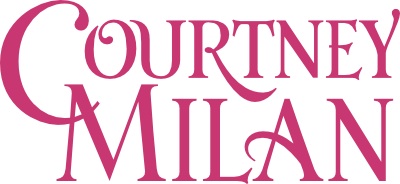The question people consistently asked me over the last days at the RWA National Conference went something like this: “So, Courtney, now that you’ve stuck it to the traditional publishing world, how do you feel?”
I don’t really feel like I’ve hurt my traditional publisher. As far as I can tell, the success of my novella has spurred sales of my traditionally published books. This makes me happy–I want to sell lots of copies of those books. I suspect this also makes my publisher happy, because they make money when my books sell, too. My publisher also now has an additional argument to help sell my October book in to accounts, and they had to put forth zero resources to get it. I can’t imagine that they’re weeping into their cornflakes.
This is not a case of “I win; therefore they lose.” The one thing I found myself saying over and over again this last week is this: I believe that a diverse, vibrant ecosystem in publishing benefits all healthy players: authors, publishers, booksellers, and agents. I also believe that we will have healthy players in all four of those categories for years to come, and I hope that I’ve proven both that self-publishing is viable and that self-publishing can complement an author’s traditionally published career in a way that benefits both the author and the publisher.
Finally, on a pure process level, I am wary of a world without agents or publishers: that would mean that you have large booksellers, who have substantial market power, dealing with authors directly, the vast majority of whom do not have any substantial market power, and where there are antitrust issues that may arise from collective action. I do not think this would be good.
So there you have it: I don’t think publishers will die, I don’t think publishers deserve to die, and I don’t think I’m killing them.

Ah, the voice of sanity.
Thank you very much. I do agree with you. I know that my own such ventures have really brought home an appreciation of the role that my print publishers play. Combine that with what I’ve learned from self-pubbing my backlist, and I’ve found that my discussions with editors are far more productive. My editors have been more than willing to talk about what I’ve learned and what ideas I have. Not to mention my improved clarity about the ideas and perspective they have.
I just want to say that I really respect how you’re going about this. It seems like a lot of traditionally published authors who decide to self-publish do so out of anger and have nothing good to say about publishers.
Publishers aren’t evil. The people who work for them do so because they love books; they aren’t out to exploit authors. It’s a changing industry and everyone is still trying to figure out how to make it work so that everyone’s best interests can be served.
Very well put, Courtney. And btw, mega-congrats on your fantastic success which doesn’t actually surprise me. I think you produce a terrific book.
I run into those questions a lot too, and in a way I’m surprised that people think somehow my more traditional publishers are losing out, or that I have a grudge against them. While that might be true for some people, I am not happy when people try to ascrtibe this viewpoint to me. In fact, I’m shocked when they do. Yes, I do like being vindicated as a good author whose stories are appreciated by readers, but that hardly means I’m getting back at anybody. In fact I doubt if anyone cares when they’re watching the sales of tmy books that they’ve published soar every time one of my re-issued books starts to soar.
I have NO interest in demolishing traditional publishing and no desire to see that happen. I just happen to be better suited to e-publishing and self-publishing and have the good sense to do what works best for my publishing career.
Right now I’m worried about the general state of the industry, but I do have faith that they will survive. I think the next few years will show a great deal of shifts toward a more hybrid form of publishing, with significant changes in many ways that will benefit both them and their authors.